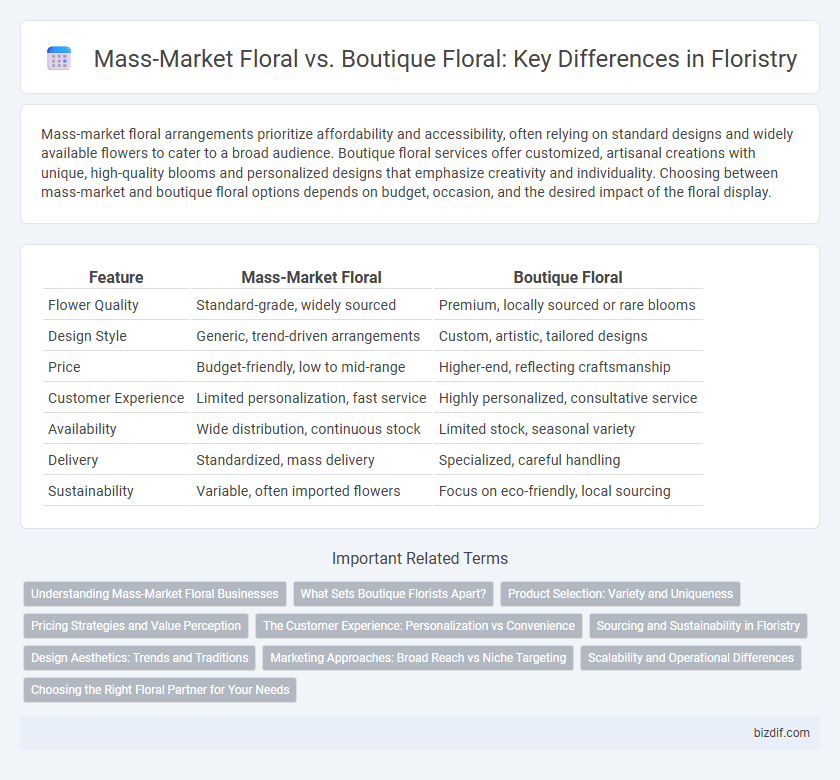Mass-market floral arrangements prioritize affordability and accessibility, often relying on standard designs and widely available flowers to cater to a broad audience. Boutique floral services offer customized, artisanal creations with unique, high-quality blooms and personalized designs that emphasize creativity and individuality. Choosing between mass-market and boutique floral options depends on budget, occasion, and the desired impact of the floral display.
Table of Comparison
| Feature | Mass-Market Floral | Boutique Floral |
|---|---|---|
| Flower Quality | Standard-grade, widely sourced | Premium, locally sourced or rare blooms |
| Design Style | Generic, trend-driven arrangements | Custom, artistic, tailored designs |
| Price | Budget-friendly, low to mid-range | Higher-end, reflecting craftsmanship |
| Customer Experience | Limited personalization, fast service | Highly personalized, consultative service |
| Availability | Wide distribution, continuous stock | Limited stock, seasonal variety |
| Delivery | Standardized, mass delivery | Specialized, careful handling |
| Sustainability | Variable, often imported flowers | Focus on eco-friendly, local sourcing |
Understanding Mass-Market Floral Businesses
Mass-market floral businesses prioritize high-volume sales by offering standardized bouquets and arrangements at competitive prices, leveraging economies of scale and extensive supply chains. These enterprises often rely on mass production techniques and global sourcing to maintain affordability and meet broad consumer demand. Understanding their operational efficiency and market reach is crucial for distinguishing them from boutique floral shops that emphasize bespoke designs and premium quality.
What Sets Boutique Florists Apart?
Boutique florists distinguish themselves through personalized arrangements tailored to client preferences, using rare and seasonal blooms unavailable in mass-market outlets. Their craftsmanship emphasizes artistic design, quality, and freshness, often sourcing locally to ensure sustainability and support local growers. This bespoke approach results in unique, memorable floral experiences that mass-market providers typically cannot replicate.
Product Selection: Variety and Uniqueness
Mass-market floral outlets typically offer a broad variety of standard flower species and arrangements designed to appeal to a wide audience, prioritizing volume and accessibility. Boutique floral shops emphasize unique, often locally-sourced or seasonal blooms, curating distinctive and customized arrangements that reflect artistic expression. This focus on exclusivity and personalization in boutiques contrasts with the mass-market approach, which centers on consistent availability and affordability.
Pricing Strategies and Value Perception
Mass-market floral arrangements use competitive pricing strategies focused on volume and affordability, targeting budget-conscious consumers seeking convenience and variety. Boutique floral shops adopt premium pricing, emphasizing handcrafted designs and personalized service that enhance perceived value and exclusivity. Customers often associate boutique florals with higher quality and uniqueness, justifying the elevated price through emotional appeal and artisanal craftsmanship.
The Customer Experience: Personalization vs Convenience
Mass-market floral services prioritize convenience by offering standardized arrangements and quick delivery, ideal for customers seeking affordable, immediate options. Boutique floral shops emphasize personalization through custom designs and tailored consultations, creating unique experiences that reflect individual tastes and occasions. This distinction highlights the mass-market's focus on efficiency, while boutique florists excel in crafting memorable, bespoke floral expressions.
Sourcing and Sustainability in Floristry
Mass-market floral sourcing often relies on large-scale farms with intensive pesticide use and extensive air freight, leading to higher carbon footprints and limited sustainability efforts. Boutique floral designers prioritize locally sourced, seasonal flowers grown using organic or sustainable practices, reducing environmental impact and supporting small-scale growers. This focus on ethical sourcing and eco-friendly cultivation enhances both floral quality and environmental responsibility in boutique floristry.
Design Aesthetics: Trends and Traditions
Mass-market floral arrangements emphasize standardized designs and popular trends to appeal to a broad audience, often featuring conventional color palettes and symmetrical forms. Boutique floral designers prioritize unique, artisanal aesthetics, incorporating seasonal blooms, textured foliage, and unconventional compositions to create personalized, trend-forward pieces. The contrast between mass-market and boutique floral design highlights the tension between tradition-driven symmetry and innovation-focused creativity in contemporary floristry.
Marketing Approaches: Broad Reach vs Niche Targeting
Mass-market floral businesses leverage broad reach marketing strategies that emphasize high-volume sales through supermarkets, online platforms, and large retail chains, targeting a wide audience with affordable pricing and seasonal promotions. Boutique floral shops adopt niche targeting by focusing on personalized customer experiences, premium quality arrangements, and exclusive designs, utilizing social media, influencer collaborations, and direct customer engagement to build brand loyalty. Data-driven marketing and customer segmentation allow boutiques to identify local preferences and deliver tailored floral solutions, contrasting with mass-market emphasis on standardized product offerings.
Scalability and Operational Differences
Mass-market floral operations excel in scalability through standardized processes, bulk sourcing, and high-volume distribution, enabling cost-effective production and broad market reach. Boutique floral shops prioritize artisanal craftsmanship, unique designs, and personalized customer service, resulting in limited scalability but higher profit margins per arrangement. Operational differences include automated packaging in mass-market setups versus handcrafted arrangements and bespoke client interactions typical of boutiques.
Choosing the Right Floral Partner for Your Needs
Mass-market floral services offer affordable, standardized arrangements ideal for large events or frequent deliveries, leveraging bulk purchasing for cost efficiency. Boutique floral shops provide customized, artistically designed bouquets crafted with premium, often locally sourced blooms tailored to personal tastes and special occasions. Selecting the right floral partner depends on your budget, event scale, and desire for uniqueness versus convenience and volume.
Mass-market floral vs boutique floral Infographic

 bizdif.com
bizdif.com